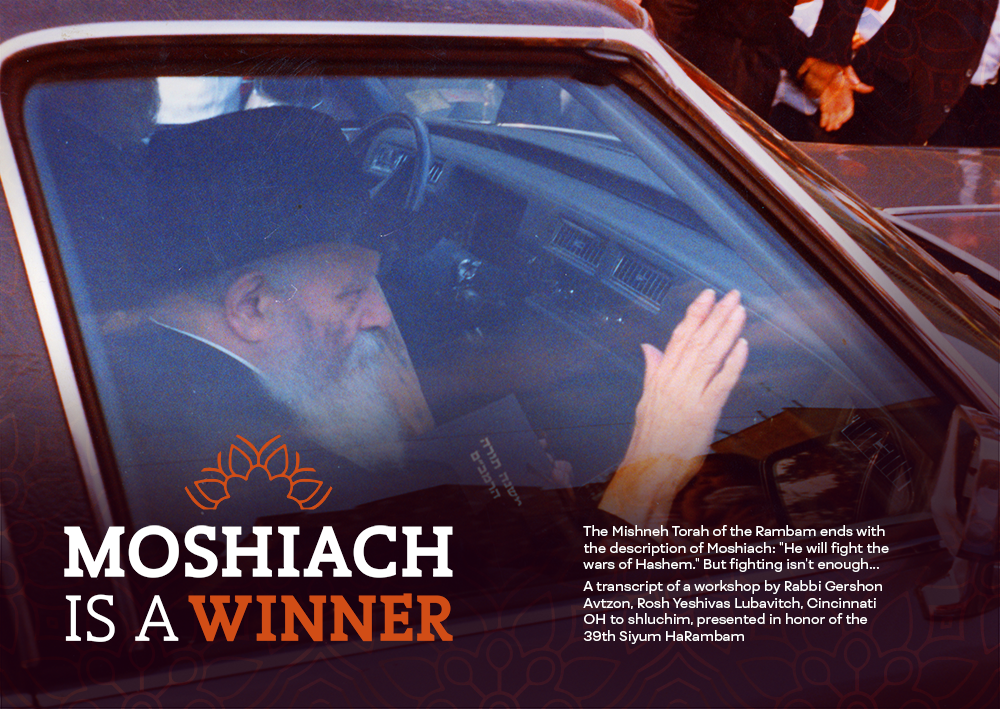Moshiach is a Winner
The Mishneh Torah of the Rambam ends with the description of Moshiach: “He will fight the wars of Hashem.” But fighting isn’t enough… • A transcript of a workshop by Rabbi Gershon Avtzon, Rosh Yeshivas Lubavitch, Cincinnati OH to shluchim, presented in honor of the 39th Siyum HaRambam • By Beis Moshiach Magazine • Full Article
Rabbi Gershon Avtzon, Beis Moshiach
I want to start by making an apology. A couple of nights ago, I had an argument, more like a friendly discussion, about how important it is for someone invited to make a speech to show up to speak with prepared notes. The person with whom I had this discussion said, “What do you mean? You come and speak from your heart and mind. Show them that you thought about it and you don’t need any notes.” In response, I said that I was taught years ago that when you come with notes, it shows the people you’re addressing that first you prepared for them and thought about what you wanted to say, and more importantly, it helps to keep you on track, remain focused, and not get distracted. As a result, I had notes prepared today, but on my flight here this morning, I was so aggressively reviewing my notes that I left them on the plane…
KEEPING THE MAIN THING THE MAIN THING
Once a year, the “Jewish Institute of Religion” holds a meeting to give a public accounting of where it spends its money. I can tell you that it’s awfully painful to see how about ten million dollars goes to interfaith dialogue, trees, the Muslims, and all the other different ideas that they can come up with. You name it – whatever doesn’t have to do with Yiddishkeit gets millions of dollars. When it comes to the Torah observant institutions, the numbers are at the bottom of the list, and Chabad institutions are almost non-existent.
In any case, I arrived at this meeting and sat through their presentation. Line by line, my heart sinks as I listen to the allocations, thinking to myself, “Oy vey, how is this going to end?” Large sums of money collected by the community, which are not even theirs, and they give them out to spend on such things. I couldn’t believe that I even came to this event. Finally, the last speaker got up and said something that on its own made it worth coming. “Ladies and gentlemen,” he said, “I want to teach you something: The main thing is to keep the main thing the main thing…”
That’s really the reason why we’re gathered here today. Conferences like this are really enjoyable – we hear shiurim, experiences, get stronger in our hiskashrus, participate in farbrengens, etc. However, the main thing is how we get our families, our communities, and ourselves ready to greet Moshiach Tzidkeinu. And today, the goal is that the main thing should remain the main thing.
NO NEED TO PREACH TO THE CHOIR
There’s a story that I like to tell because it brings out the main point of our discussion: There once was a stunt man whose profession was walking the tightrope. He was preparing to do this across Niagara Falls, and he put out an advertisement for all to come and watch the event, free of charge. As you can imagine, hundreds and thousands of people came to see this crazy person cross the falls on a tightrope. He climbed up the ladder, reached the top of the rope, and is about to start his dangerous journey. Then, he announces to the crowd, “I can’t walk by myself. I can only cross the falls on this rope if you all announce that you believe that I can do it.” They all screamed, “I believe you can do it! I believe!”, and he walked across the falls and returned to the other side. The crowd thought that the show was finished, but it wasn’t. He had someone bring out a wheelbarrow and then he said, “Do you think that I can cross the falls with a wheelbarrow?” When the crowd replied, “Maybe,” he said that he could only do it if they say that they believe. “I believe, I believe!” they all said, and he crossed back and forth. Now, they thought for sure that the performance was over, but then he said, “And now for my final act, I’m going to show how I can cross the falls with a wheelbarrow – and with somebody in it. But I can only do it if you say that you believe.” Sure enough, everyone said, “I believe, I believe!”, to which he said, “Any volunteers?”
It’s very easy to say that we believe. However, the question is: Are we ready to get in it? Today, you are showing that you are ready to be in it. Coming to this gathering today on a Sunday afternoon, while the company is great, whoever came today is declaring a commitment that he’s in – and I don’t have to preach to the choir. My speech today has nothing to do with being in it; that would be a speech for people who are not here. To convince them to come here, I would have to give them a speech on why they should come. However, I have learned this year something that has really changed my outlook on things: It’s not enough to be in it, you’ve got to be in it to win it…
HORSES RUNNING HOW THEY SHOULD AND AS THEY SHOULD
There’s a big difference between the two. When did this start? One of the privileges of being a teacher is that I get to come with my family to the Rebbe for Yom Kippur and Sukkos, when school is on vacation. On my teacher’s salary, while I can’t necessarily afford seats in 770 during that time, one of the bonuses that my father gives me every year, knowing that it’s very important to me, is to arrange places for me and my two sons in 770. My seat is located in the first row under the women’s section when you enter the main shul.
This past Erev Yom Kippur, I sat down and started all my preparations for Kol Nidrei. It was actually an interesting time, as it was very quiet because all the bachurim were upstairs for Birkas HaBanim, and only the ba’alei batim were downstairs. When you come into 770, it’s like a printing press with an endless supply of new material on the tables. There was a wonderful publication printed this year with a daily diary from one of the years of the Rebbe’s nesiyus, including a variety of stories. One of the sections of this publication was on various notes in the Rebbe’s holy handwriting.
When you see the Rebbe’s edited notes, what he takes out and what he puts in, you realize what is very important to the Rebbe. If he added something, it means that the Rebbe really feels that it should be there. There was a transcript of Birkas HaBanim from a certain Erev Yom Kippur, where the Rebbe said that a tamim has to go out and do the avoda of fighting the wars of Hashem. In his own handwriting, the Rebbe added three words: “Un menatzei’ach zein.” [= and to be victorious]. It’s not enough to fight, you have to win.
I thought to myself: How can I describe the difference between someone who fights and someone who wins? Is it a matter of a stage in time, you start fighting and eventually win, or is it a different mentality between a fighter and a winner? I literally turned to the person sitting next to me, an eminent chassid from Crown Heights named Tzvi Goodman, son of the horse trainer from Baltimore, R’ Gedalia Goodman, and I asked him what he thought. He looked at the page and then said to me: “Gershon, while I can’t tell you about a bachur’s education – whether there’s a difference in stages or mentality, I can tell you about different horses. A winning horse and a racing horse are in different leagues. Horses that win are born different, raised different, and act different. It’s not just that all the horses run and some of them win; a winning horse is a different breed of horse, a breed of its own. They’re trained differently – and they win.”
After Yom Kippur and literally for the last month or so, I’ve really been doing a lot of thinking. I starting Googling and reading about how to become a winner, because I’ve realized in my own life that we were trained to be fighters in the wars of Hashem – fighting the good fight. I wanted to learn the Rebbe’s sichos and letters, just trying to understand what makes someone a winner. We can’t just fight. In the sicha of Parshas Chayei Sara 5752, you’ll notice an interesting line. The Rebbe speaks about the wars of Moshiach, how we are already starting to see signs of the victory.
DON’T PLAY THE VICTIM; YOU’LL NEVER WIN
Now, most people think that means the shlichus is gradually processing and growing – and this is also true. However, the Rebbe is telling us that Moshiach is not just a fighter. Part of the halachic definition of Moshiach is not just someone who fights G-d’s wars. He also has to win; Moshiach is a winner. Today, I want to share with you a few tips that I’ve learned in the last month from research and speaking with people extensively about the difference between a fighter and a winner. What can we walk away with? Fighting the wars of Moshiach has been going on for years, but the Rebbe doesn’t just want us to be in it, he wants us to win it. We have to be winners, not fighters.
Mesirus nefesh was good for the past. In the Rebbe Rayatz’s time, there were fighters. The Rebbe’s generation has winners. We are in it to win it.
What are the characteristics of a winner? What can we learn from this conference, dedicated to getting our families, our communities, and ourselves ready to greet Moshiach, not just to get back into the fight? I want that to change. We have to go back and figure out how to win this fight. Let’s now talk about five points distinguishing between a fighter and a winner.
Point #1: No victim is ever a winner. In the history of any fight, someone who felt that he was a victim never won. Somebody who just fights, yet feels in the back of his mind that he’s a failure and that it’s someone else’s fault, can remain a fighter but can never be a winner due to his victim mentality. Being a winner in our own minds is the most important thing in our shlichus in general and getting the world ready for Moshiach in particular. A winner doesn’t look at failure to put him down, rather as another opportunity to be successful.
FAIL – FIRST ATTEMPT IN LEARNING
You all know the story of two shoe salesmen sent to Africa by Nike to sell shoes. They were there for a month, and the first salesman sends a letter to the Nike CEO: “Dear Sir: Please let me come home. There’s no one in Africa who wears shoes.” Whereas, the second salesman sends a letter: “Dear Sir: Please send another container of shoes. There’s no one in Africa who wears shoes.” Everything is an opportunity. The victim falls and the winner grows.
In inspirational classes, they say that the word ‘fail’ is an acronym for “first attempt in learning.” A winner in spiritual matters understands that he might fail, but it’s only an attempt for further growth in order to be successful on our shlichus in general. This is especially true in the avoda of greeting Moshiach Tzidkeinu. Your community, your family, and you most importantly, have to view yourself as a winner.
Here’s a true story: There’s a Jew in Cincinnati, Ohio, who says very openly that his first experience in Yiddishkeit growing up in Massachusetts was when a shliach invited his mother, who didn’t know anything about Yiddishkait, to send him to Hebrew school and give him tzitzis to wear. This was the first person to touch his neshama, and there’s no secret about it. This man is now a very wealthy and successful doctor, and I called him up one day. At that time, he had a son in the seventh grade, and there was talk in town that he was going to donate a lot of money to open another school in Cincinnati.
Of course, that didn’t bother me; he can open a hundred schools and that’s perfectly all right. What did bother me was that he sends his son to our school, and he could have put the money there. This man is not some Litvisher guy from birth, who says that his father learned in Brisk, his grandfather learned in Brisk, so his son will learn there as well. That isn’t his path because he has no path, he knows only Lubavitch. Thus, for all practical purposes, he can send his son to yeshiva, give us the money, and everything will be fine. However, he said, “No, I’m not sending my kid to Lubavitch. I want him to be Litvish, not Chabad.”
“Doctor, you sound as if you’ve been in Brisk for generations. Why don’t you want him to be a Lubavitcher?” I asked.
“The few shluchim that I’ve met,” he replied, “every time I meet them, they tell me how things are so tough for them, Chabad is always so persecuted, etc. I feel that I’m talking to a bunch of victims whenever I speak to my local shliach. When I speak to the Litvishers, they tell me how much they’re growing. I want my kids to be with the winners…” It wasn’t an ideological thing. He had no hang-ups or history. He wanted his son to be a winner, not a victim.
We have to shift our mentality. Sometimes, I speak to chassidim deeply involved in Moshiach matters and hear so much kvetching about how certain systems are against us – we become victims. How are we supposed to bring Moshiach if we feel like victims? This must be deleted from our psyche and our mindset. It’s okay that things are tough, things are allowed to be tough and they always will be. However, people gravitate to winners and distance themselves from victims. Thus, first and foremost, the concept of being victorious starts in our minds.
SINAI SCHOLARS 2.0
Point #2: A winner is in constant focus of what his goals are. Some victims do have clear goals – they know where they want to go, but it doesn’t drive them at every moment. It’s not visually in front of them on a regular basis. Once in a while, they remind themselves of their big plans, but it’s not always standing before them. In contrast, winners knows their goal and destination, and it’s constantly in front of their eyes. They eat it, they sleep it, they breathe it, they discuss it – it totally permeates their existence and gives them that feeling of excitement.
I gave a class recently about Moshiach to students at Miami University in Oxford, Ohio, about forty-five minutes from Cincinnati. They have a fascinating course there called Sinai Scholars, which enables shluchim not only to teach professional courses to college students, it actually pays the college students to come. Thus, a student who comes committed and gets paid, you obviously have a good opportunity to affect him in a very strong way. The local campus shliach, Rabbi Yossi Goldberg, did what he called Sinai Scholars 2.0, and the students who bought into the program moved up to the next level. The highlighted class in the Sinai Scholars 2.0 course was an open discussion of what it’s really all about – Moshiach, and Rabbi Goldberg invited me to give this class.
During my class presentation, which really gave them a proper perspective, we spoke about Lubavitch’s obsession with Moshiach. I told them that I wanted to teach it to them in three parts. First, there was the Rebbe’s letter about how as a child going to cheder, he was already envisioning Moshiach. Secondly, his accepting the leadership of Chabad on Yud Shvat 5711, when the message from that day forward was about bringing Moshiach. Finally, there was the sicha of Chof-Ches Nissan 5751, when the Rebbe said that it’s our job to bring Moshiach. I then asked the students what, if any, pattern did they see emerging in these three stages. One student raised his hand and said that the Rebbe never lost focus on Moshiach from Day #1.
It’s not that Lubavitchers woke up one day and started thinking about Moshiach. Here’s somebody who’s writing to the President of Israel that he was already thinking about Moshiach as a child. On his first day as Rebbe, he’s telling his movement what the main message is. In short, he shows himself to be someone who has never lost focus. This is how a winner operates. A winner never loses focus on the goal; he never wavers.
If we say that we have a goal to win, but it only occurs once a year, i.e., the whole concept of Moshiach is “Moshiach’s Seuda” on Acharon Shel Pesach, we’re never going to bring Moshiach that way. It’s not going to happen because it’s not part of us. Winners don’t operate like that.
THE MEANS ARE JUST AS IMPORTANT AS THE ENDS
Point #3: We tend to associate winners with revolutionaries – and that’s true to a certain extent. A revolutionary is very good at fulfilling the second point. He’s always passionate in thinking about the goal. The problem is that revolutionaries usually don’t respect the process. By definition, they don’t respect details. Winners, on the other hand, do respect the process. They know that it takes time, and building a victory starts detail by detail. They don’t disassociate the process from the goal. The process is just as important to them as the eventual victory, looking at the process as part of the victory.
We tend to be very excited about making the world ready for Moshiach. However, the day-to-day details on its implementation are so boring and tedious, we almost say, “What does this have to do with Moshiach?” The Rebbe said on Shabbos Parshas Pinchas 5751 in the most famous sicha of “Mach Da Eretz Yisrael” that to be victorious, we have to incorporate and encompass all the details – thought, speech, and action, in the manner of a chassid serving G-d b’pnimiyus. Being victorious in achieving a goal starts in the preparatory stages for that goal; everything has to be thought out, processed, legal, and detailed. If we visualize and respect the process as part of the victory, that helps us. The winning horse doesn’t just cross the finish line, it’s groomed and trained differently, it eats and sleeps differently. The process is just as important as the victory.
THERE’S NO NEED TO RE-INVENT THE WHEEL!
Point #4: A winner is ready to change; a fighter is not. How many times do you meet an old soldier, an old shliach, or an old rabbi who says, “Don’t tell me! I’ve been doing things this way for thirty-five years!” There’s a story of a coachman who used to drive a horse and buggy. Someone got into his coach and said, “There’s two ways to go – right or left.” He asked the coachman, and he said that he’s going to the left. The passenger said that he had heard that going to the right is so much smoother, whereas the left path is dangerous, because it’s filled with potholes. The coachman replied: “No, I’ve been driving this way for thirty-five years!” They set out on their journey, take the left route, and immediately fall into a hole. “Driver,” the passenger said, “I thought you said that you had thirty-five years of experience.” The coachman said: “That’s right! I’ve been falling into this hole for thirty-five years!”
A winner is ready to re-evaluate. If it’s not working, he’s ready to change because his way of doing things is not as important as being victorious. Furthermore, he’s even ready to learn from someone who’s younger than him. “Who is wise? He who learns from every person.” While it’s quite easy to say that in a Pirkei Avos class, how many of us are ready to hear from someone half our age? How many of us are ready to hear from one of our former students, asking him how to succeed? It’s very humbling, but that’s what winners do, because winners want good information. Winners learn from winners, and if you see somebody who’s been successful, you don’t look at his age or place of origin, you ask him what he’s doing so you can follow suit. Fighters get stuck, but winners don’t.
There’s a fascinating story about a prominent young chassid in Crown Heights named Rabbi Levi Feldman, an eighth-grade teacher in Oholei Torah. During the summer, he gives courses for teachers, and just before the summer break, our school had an administrative staff meeting. At this meeting, one of the faculty members mentioned that he was planning to go to this course. This teacher was actually younger than Rabbi Feldman, while another much older staff member commented that he had been Rabbi Feldman’s teacher in cheder. When I heard this, I was certain that this elder teacher would then say, “I’m sure you’re not going to ask me to attend his class since I was his teacher.” Instead, he said, “If the class is good, please let me know because I will sign up next summer.”
Companies do not hire solely based on age. On numerous issues, particularly of a financial nature, I have written to the Rebbe in Igros Kodesh and received answers stating (in effect), “You’re not the first person to do this. Find other yeshivos that were successful in this matter and ask them how they did it.” There’s no need to re-invent the wheel! There were certain matters where I had a serious problem, and although it wasn’t easy for me, I called Rabbi Halberstam, head of the Chabad mesivta in Chicago, and sought his advice. It’s a humbling process, but so what? We don’t know everything, and there’s no need to go through the same mistakes as everyone else. Winners want to learn from winners – no matter whom.
THE JUDGE IS MY FATHER
Point #5: To be successful in the avoda of greeting Moshiach Tzidkeinu, you really have to believe that the war has already been won. We just have to bring that out in the world. There’s a story of two people before Rosh Hashana: a Chassid and a Litvisher. The Litvisher is crying, doing teshuva, and saying Selichos in preparation for the Day of Judgment, while the Chassid is walking and smiling happily. The Litvisher asks the Chassid, “I don’t understand. Don’t you people believe in the Day of Judgment? How can you walk around with a smile?” The Chassid replied: “Of course, we believe in the Day of Judgment, and it’s very scary. But I know something that you don’t know: I know that the judge is my father…” Yes, we’re going to have to go through the process of the court case, but the war is already won.
When the Rebbe tells us repeatedly, “When you go out to war against your enemies,” this isn’t just some nice dvar Torah, it’s the real thing. If we believe in our minds that the war has been won, then we can be winners and eventually make our communities into winners.
In summation, the avoda of preparing the world to greet Moshiach Tzidkeinu is not just getting people to fight the wars of Moshiach, but to emerge victorious. Be in it to win it!
*
The magazine can be obtained in stores around Crown Heights. To purchase a subscription, please go to: bmoshiach.org
138
Join ChabadInfo's News Roundup and alerts for the HOTTEST Chabad news and updates!










































